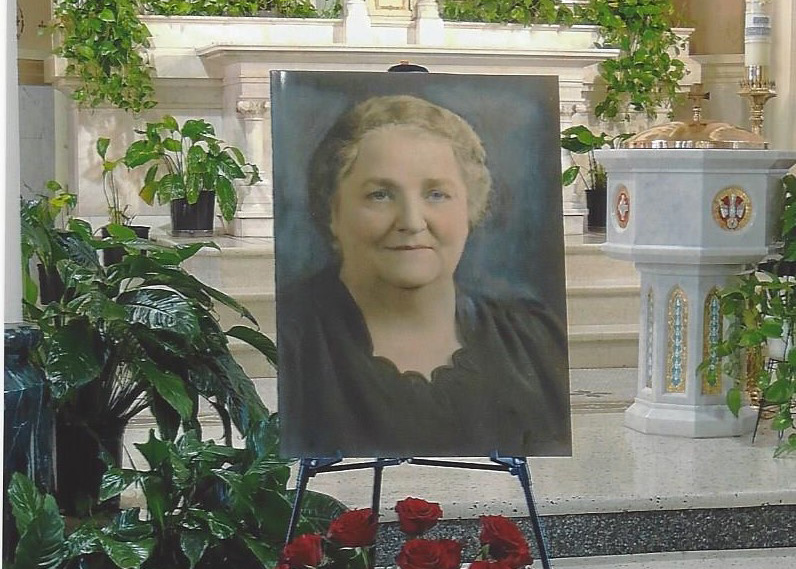
Click here for more information about the life of Rhoda Wise and her sainthood cause.
By Ann-Margaret Lambo and Pete Sheehan
Catholic News Service
CANTON, Ohio (CNS) — In the fall when the Diocese of Youngstown formally opened the sainthood cause for an Ohio woman known for her life of prayer and spiritual gifts, more than 1,000 people filled St. Peter Church in Canton.
It was standing-room-only at the Mass to officially open the cause for Canton’s Rhoda Wise, known for her healing gifts and the stigmata, wounds that resemble those of Christ on the cross.
Though raised a Protestant, Wise (1888-1948) later embraced Catholicism and was devoted to the Sacred Heart of Jesus, the Rosary and St. Thérèse of Lisieux, known as the “Little Flower.”
People of all ages, most from Stark County, but many from out-of-state, came to Wise’s home parish church for this first step in her journey to possible official recognition as a saint. Msgr. Robert Siffrin, diocesan vicar general and moderator of the curia, was the main celebrant.
The number of people at Mass “shows how many people she touched while she was alive or after (her death),” said Fr. Edward Beneleit, pastor of St. Peter, told The Catholic Exponent, Youngstown’s diocesan newspaper. “It shows the devotion to her. This is the crowd that is really faithful.”
Among those who claimed miraculous healing from Wise was Mother Angelica, founder of the Eternal Word Television Network, who said she was cured of a painful stomach ailment after praying with Wise, who led her in a novena to St. Thérèse of Lisieux. Our Lady of Angels Monastery in Alabama, which Mother Angelica also founded, for years supported the Rhoda Wise Shrine, which was built in the home of Wise and surrounding property in Canton.
With her cause officially opened, Youngstown Bishop George V. Murry declared her a “servant of God.” A postulator has been named, and a local tribunal will open an inquiry into her life. Tribunal members will examine any writings Wise left, any historical records about her and any testimony from people who knew her and make a recommendation to Bishop Murry.
The diocese in turn will make a recommendation to the Congregation for Saints’ Causes at the Vatican, which then reviews the gathered information. If the congregation finds she led a heroic life of Christian virtues, the Church bestows the title “Venerable.”
The next steps would be beatification and canonization. In general, two miracles are needed for sainthood — one for beatification and the second for canonization.
Prayers for Wise’s cause will take place in the evening on the first Thursday of each month with Mass, Rosary and Eucharistic Adoration, said Karen Sigler, director of the Rhoda Wise Shrine.
Capuchin Father Joseph Tuscan, a member of the board of the Rhoda Wise Shrine, who attended the Oct. 7 Mass, noted that Pope Francis keeps saying “for the New Evangelization we have to go out to the fringes. The house where she lived was (located in) a poor place, is still a poor place and it’s very unintimidating.”
“People come there who are not religious, people who are Catholics, fallen-away Catholics, Protestants, Jews, Muslims, people with no religion, because they are fascinated by the story. Everyone who comes there experiences a sense of peace,” Fr. Tuscan said. “In a certain way, everyone who comes in takes one step closer to God.”
The priest said Wise really suffered throughout her life, dealing with financial disaster, the death of a young daughter, an alcoholic husband, as well as her own serious health issues. During one of her hospitals stays, before she became a Catholic, a nun told her about the Rosary and St. Thérèse.
Wise reportedly experienced her first apparition of Jesus May 28,1939, and about a month later had an apparition of Jesus with St. Thérèse. Wise was cured of her stomach cancer, which was considered incurable by her doctors, who had sent her home to die. On Aug. 15, 1939, St. Thérèse is said to have miraculously healed Wise of a broken foot.
“Everyone suffers, but in a way, Rhoda Wise, aside from being a witness to the people on the fringes, is an answer to the question of human suffering,” Fr. Tuscan added. “Rhoda wasn’t crushed by her suffering. She became a source of hope. And I think that perseveres.”
According to Wise’s writings, there was a continuous stream of visitors -– mostly strangers — at her house. As many as 10,000 people came on one day during the height of the devotion, Sigler said.
Though it might be a colossal disruption to most, those who knew her, including some of her grandchildren who were present that night, said that Wise welcomed everyone -– those desperate to be healed or freed or calmed -– in her tiny, three-room house.
“It was a normal house. We had arguments, dinners at the table, bath time, yard work, house work. It was our home,” said Tammy Schuette of Salem, Wise’s granddaughter. “To us, it was not unusual when people came to the door at 10 o’clock.”
Lambo writes for The Catholic Exponent, newspaper of the Diocese of Youngstown; Sheehan is the paper’s editor and general manager.






